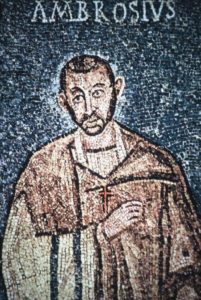Commemoration of Ambrose of Milan, Pastor and Hymnwriter
December 7
The Lord be with you
December 7th is the day set aside on the LC-MS liturgical calendar to remember Ambrose. Ambrose was the first Latin Church leader to be born, raised, and educated not as a pagan but as a Christian. He was born about 339 in the city of Treves (Trier) in what is now France, where his father was Prefect of Gaul, the governor of a large part of Europe. Ambrose studied the classics and the law at Rome, and before he was thirty-three, he was named governor of Liguria and Aemilia, with headquarters in Milan, which was at that time the seat of the imperial court. When the Arian bishop of Milan died, Ambrose settled the violence that broke out between the Arians and the Catholics. Both sides unanimously insisted that he become their bishop, even though at that time he had not yet been baptized. (It was a custom of the time to delay baptism until late in life so that one might be cleansed close to the time of death.) Ambrose finally bowed to pressure from Church and state authorities and rapidly was baptized, ordained priest, and consecrated bishop; some say it was all done on the same day, December 7, 373 or 374.
 He gave a portion of his family wealth to the poor and set an example of strict asceticism. Although the Roman Empire was in decline, Ambrose, by his preaching, writing, organizing, and administration, made Milan one of the most distinguished centers of learning and Christian activity, in some way surpassing even Rome itself. He was a powerful preacher, and his sermons affected many, most notably Augustine of Hippo, whom he baptized in Milan at the Easter Vigil, 387.
He gave a portion of his family wealth to the poor and set an example of strict asceticism. Although the Roman Empire was in decline, Ambrose, by his preaching, writing, organizing, and administration, made Milan one of the most distinguished centers of learning and Christian activity, in some way surpassing even Rome itself. He was a powerful preacher, and his sermons affected many, most notably Augustine of Hippo, whom he baptized in Milan at the Easter Vigil, 387.
The empress Justina, mother of Valentinian, jealous of the growing importance of Ambrose, organized a coalition against the bishop and at the beginning of Lent in 385, demanded that one basilica in Milan be given to the Arians. Ambrose refused, and a riot broke out in the city. Just before Easter, Justina demanded the bishop’s own cathedral. On Palm Sunday, there were a series of clashes between the imperial troops and Ambrose’s congregations. On Maundy Thursday the court abandoned its attempt to seize and hold a church. The struggle, however, continued. An edict against the Catholics was promulgated in June 386, and Ambrose was summoned to appear before the emperor. He refused and took refuge in his basilica, which was surrounded by imperial troops. Inside, Ambrose and his people spent the time singing psalms and hymns of their bishop’s own composition. At length, the court was forced to rescind the edict.
Ambrose was a zealous defender of orthodoxy and one of the most important Latin authors of his day. At the request of the emperor Gratian he wrote On the Christian Faith. He is also the author of a work of pastoral care, On the Duties of the Clergy. One comes closest to the saintly bishop, perhaps, through his hymns. He was one of the first to write metrical Latin hymns, and many of them are still sung in Christian churches. Three of them have been included in the Lutheran Service Book: “Savior of the Nations, Come,” LSB 332; “O Splendor of God’s Glory Bright,” LSB 874; and “O Blessed Light, O Trinity” LSB 890. St. Augustine, addressing God, says of Ambrose’s hymns:
The tears flowed when I heard your hymns and canticles, for the sweet singing of your church moved me deeply. The music surged in my ears, truth seeped into my heart, and my feelings of devotion overflowed, so that the tears streamed down. But they were tears of gladness. (Confessions, IX, 6-7)
While there are many Icons of the saints, Ambrose is the only Church Father of whom we know for sure his image is based on the real man. There is a mosaic with his name that adorns a chapel in the basilica dedicated to his brother Satyrus that was made at the beginning of the fifth century, shortly after his death.
Ambrose died at Milan on Easter Eve, April 4, 397.
The video below is of the Ambrose hymn “Savior of the Nations, Come.” On a “Lutheran” note, it was Martin Luther who translated the hymn into German.
Collect for the Commemoration of Ambrose:
O God, You gave Your servant Ambrose grace to proclaim the Gospel with eloquence and power. As bishop of the great congregation of Milan, he fearlessly bore reproach for the honor of Your name. Mercifully grant to all bishops and pastors such excellence in preaching and fidelity in ministering Your Word, that Your people shall be partakers of the divine nature; through Jesus Christ, our Lord, who lives and reigns with You and the Holy Spirit, one God, now and forever. Amen.
Other Prayers appropriate for the Commemoration of Ambrose:
• For those who are persecuted for the Christian Faith by their government,
• For lawyers and government officials,
• For preachers of the word of God
• For hymnwriters,
• For a joyful confidence in God’s care,
• For the church in Milan and in northern Italy,
• For all leaders of the church that they may show by their lives and preaching a dedication to the truth Christian Faith and the love of God for the world.
(Adapted from New Book of Festivals & Commemorations: A Proposed Common Calendar of Saints, Philip H. Pfatteicher)
Blessings in Christ,
Pastor John Rickert
